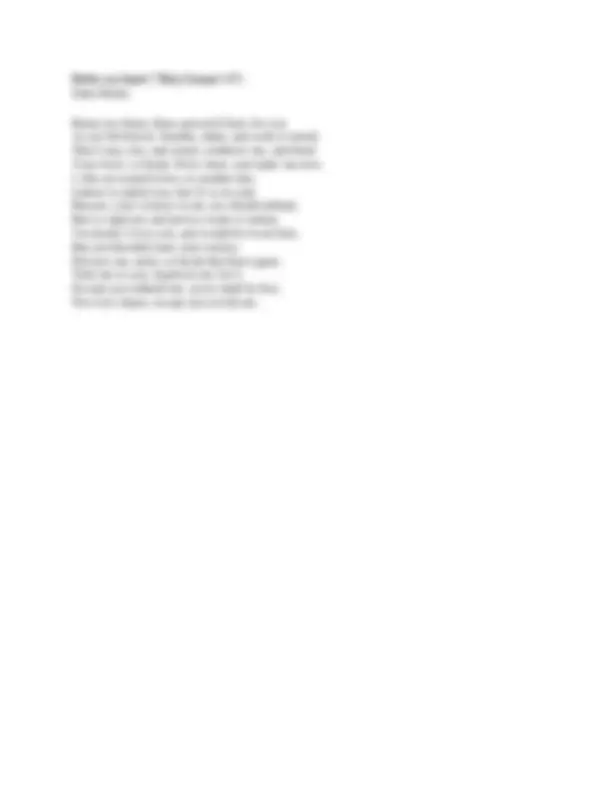



Study with the several resources on Docsity

Earn points by helping other students or get them with a premium plan


Prepare for your exams
Study with the several resources on Docsity

Earn points to download
Earn points by helping other students or get them with a premium plan
Community
Ask the community for help and clear up your study doubts
Discover the best universities in your country according to Docsity users
Free resources
Download our free guides on studying techniques, anxiety management strategies, and thesis advice from Docsity tutors
John Donne wrote 19 Holy Sonnets, most of them probably between 1609 and 1611. These years seem to have been a time of spiritual crisis for Donne, ...
Typology: Lecture notes
1 / 2

This page cannot be seen from the preview
Don't miss anything!


Critic: William Zunder Source: Reference Guide to English Literature, 2nd ed. , edited by D. L. Kirkpatrick, St. James Press, 1991 Criticism about: John Donne (1572-1631)
Nationality: British; English
John Donne wrote 19 Holy Sonnets, most of them probably between 1609 and 1611. These years seem to have been a time of spiritual crisis for Donne, as well as part of a larger cultural crisis for England. In 1602 he had been dismissed from his post as secretary to Sir Thomas Egerton, Elizabeth's lord keeper, on account of his unauthorised marriage the previous year. And between then and his ordination in 1615, his life was one of unemployment, isolation, and alienation from the court, which, in the early years of the 17th century, was the centre of English life. At the same time, the characteristic changes of the period were gathering head: the shift from a feudal to a capitalist economy, the growth of puritanism, the rise of science, the increasing rift between Parliament and crown. It was a critical development registered in Donne's two Anniversaries , published in 1611 and 1612.
The Holy Sonnets, then, represent a turning to God at a moment of personal and cultural crisis. Holy Sonnet 14 begins with a forceful, even aggressive, assertiveness, of a kind found in the love poems: in The Canonisation,'' for instance. Here, however, the person addressed is not the reader, or a woman, but God.Batter my heart, three-personed God,'' says Donne. For,'' he adds, using an unusually homely metaphor of a tinker mending pots,you/As yet but knock, breathe, shine, and seek to mend.'' Something more violent is demanded. That I may rise, and stand,'' he goes on, immediately and characteristically alert to paradox,o'erthrow me''; and, moving on to another unusually commonplace image, ``bend/Your force, to break, blow, burn, and make me new,'' like a blacksmith, the lines gaining a sense of enormous force from their enjambment and from the alliteration and emphasis on the packed, brief verbs in line 4.
Although the emotion is violent, it is also carefully contained within the sonnet form, in a way typical of the Holy Sonnet, where Donne can be seen using the form to control the experience being expressed: in this poem, the desperate need for some sort of inner renewal. The initial plea, therefore, presented in the guise of a succession of commands, is contained within the first quatrain. And the move to the second quatrain marks both a shift in tone and a transition of thought. I,'' explains Donne, changing to political imagery,like an usurped town, to another due,/Labour to admit you'' to admit God, his rightful ruler but oh, to no end.'' The attempt is fruitless, becauseReason your viceroy in me'' God's deputy in him ``me should defend,/But is captived, and proves weak or untrue.'' In the face of the rapidly and radically altering world of 1609, in which he plays no part, Donne is helpless.
Source: William Zunder, "Batter My Heart (holy Sonnet 14): Overview" in Reference Guide to English Literature, 2nd ed. , edited by D. L. Kirkpatrick, St. James Press, 1991.
Source Database: Literature Resource Center
Batter my heart (“Holy Sonnet 14”) John Donne
Batter my heart, three-person'd God; for you As yet but knock, breathe, shine, and seek to mend; That I may rise, and stand, o'erthrow me, and bend Your force, to break, blow, burn, and make me new. I, like an usurp'd town, to another due, Labour to admit you, but O, to no end. Reason, your viceroy in me, me should defend, But is captived, and proves weak or untrue. Yet dearly I love you, and would be loved fain, But am betroth'd unto your enemy; Divorce me, untie, or break that knot again, Take me to you, imprison me, for I, Except you enthrall me, never shall be free, Nor ever chaste, except you ravish me.